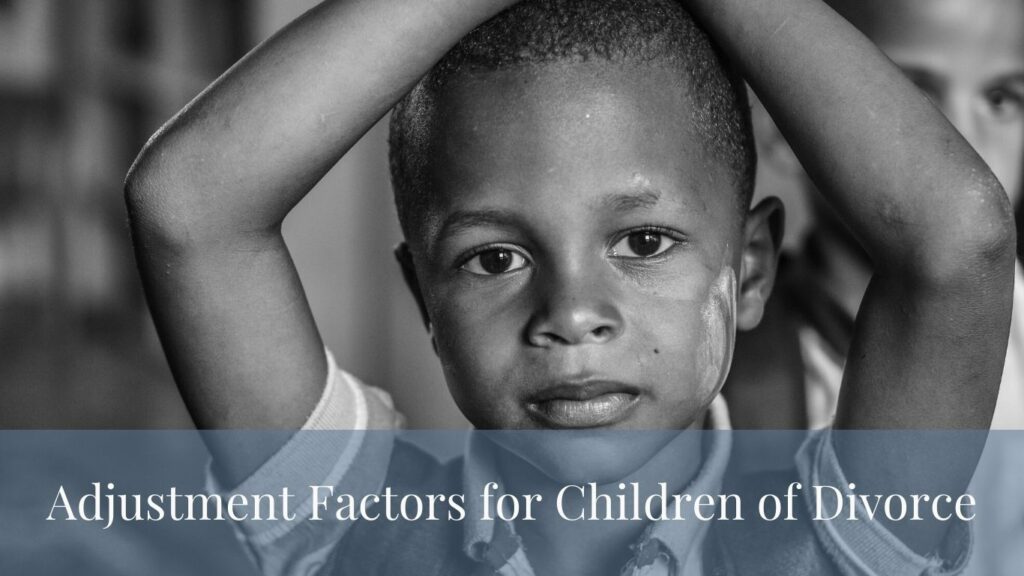Adjustment Factors for Children of Divorce

There are many factors, which affect how children of divorce are able to cope. Some of those factors we can influence through our own actions, others we may have no control over. Researchers have estimated that the period of adjustment for families can range anywhere from one to three years, and sometimes even as long as five, depending on the circumstances surrounding the divorce.
It is important for parents to realize children will have different types of reactions. Some may be short-term reactions that are in response to the crisis nature of divorce. Others may be long-term reactions that could be either positive or negative depending again on how parents are able to help their children.
Some factors that may affect adjustment are:
- Level of conflict between parents
- How parents adjust to divorce
- Information children are given regarding the divorce
- Level of support available to child
- Child’s personality
- Child’s ability to deal with stress
- Age and developmental level of children
LEVEL OF CONFLICT BETWEEN PARENTS
One of the most significant factors affecting the adjustment of children is the level of conflict between parents. Exposing children to constant fighting, criticism of the other parent or heated custody battles can be very damaging. When parents are able to put their individual differences aside and cooperate, adjustment of the children will significantly improve. Don’t allow the other parent’s actions to affect your relationship with your child. Even though you may have an uncooperative ex-spouse, you can choose to avoid conflicts, maintain a “businesslike” relationship and be a stable, positive influence in your children’s lives.
HOW PARENTS ADJUST TO DIVORCE
One of the largest determining factors in how well children adjust to divorce is how well parents adjust to divorce. Children will look to their parents for signs that the family can and will get through this. Therefore, parents need to role model appropriate and healthy ways to deal with the many feelings that surround divorce. Parents can also work towards re-establishing a sense of family through providing consistency and structure. Bottom line, the choices you make can and will tremendously impact the lives of your children. Positive choices will serve your children far better.
INFORMATION CHILDREN ARE GIVEN REGARDING DIVORCE
To assure your children receive information that is supportive and helpful, keep the following factors in mind.
Be sure children know they are loved and that the divorce is not their fault.
Keep information age appropriate
Address children immediate concerns (i.e., where are we going to live, will I go to the same school…?)
Minimize conflict with other parent. Avoid verbal retaliations.
Never discuss grownup issues with children such as court matters, child support, finances or intimate details regarding the divorce.
Avoid placing blame on the other parent or telling children your side of the story
AGE AND DEVELOPMENTAL LEVEL OF CHILD
Many parents want to know when divorce occurs, at what age does it least effect children. In actuality there is no best age for divorce to happen. Each age and stage of development presents different issues and challenges. Parents should familiarize themselves with characteristics of normal child development while paying attention to changes in their child’s behavior.
LEVEL OF SUPPORT
Following a separation or divorce, it is helpful to minimize the changes in your children’s environment. Because divorce can leave a child feeling anxious or insecure, maintaining the familiarity of school, outside activities or neighborhood friends can be helpful. Also, make sure your children are able to maintain contact with significant extended family members on both sides. Children need to have someone safe they feel comfortable talking to about how they are feeling. This doesn’t necessarily need to be a professional it could be a neighbor, troop leader, pastor, teacher or school counselor. Check out area schools and religious organizations for supportive programs offered to children and families with divorce issues.
CHILD’S PERSONALITY
Children will respond to situations and circumstance in a variety of ways. Even children within the same family are going to respond to divorce differently. Some children are better able to cope with stressful situations; others may deal with stress by acting out or withdrawing. Most importantly pay attention to the clues your child is giving you through their behavior. If you are noticing drastic changes in their behavior or if the behavior is persistent (lasting 6 months or longer) consider seeking out professional help.
CHILD’S ABILITY TO DEAL WITH STRESS
Just as children have different personalities they also all have different ways of coping with stress. Some children are more resilient than others and may be more capable of dealing with the stress generated by divorce. Clearly, your child will benefit greatly if you can help them find healthy ways of coping with their feelings as well as stress. Also, keep the lines of communication open between you and your kids.





